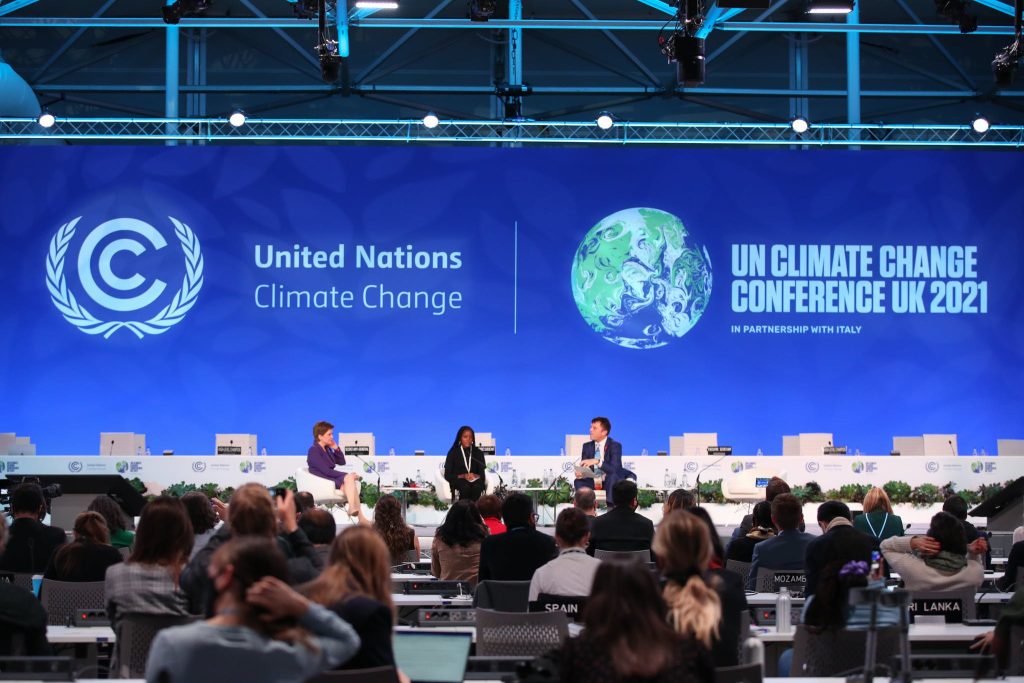
members maintain a dialog on the COP 26 stage. picture: Kiarra worth/ UNFCCC
as a consequence of the world turns the online page on the 2021 United Nations local climate Change convention (COP26), UN basis vice chairman for vitality, local climate, and the environment Pete Ogden sat down with journalist Mark Leon Goldberg to mirror on the two-week marathon of negotiations. They talked about key outcomes and takeaways, accomplishments to be hopeful about, and areas the place work nonetheless should be executed. This interview was recorded for the world Dispatches podcast and has been edited for size.
Mark Goldberg: What’s your massive-picture takeaway from COP 26?
Pete Ogden: to current some context, this was the most important COP for the rationale that Paris settlement was struck in 2015. the most interesting means that the distinctive Paris settlement was arrange is that nations come collectively in 5-yr cycles to reevaluate and enhance their very personal nationwide local climate targets. The understanding in Paris was that whereas a extreme-line objective had been set of limiting world warming to effectively beneath 2°C, and with a subgoal of making an try to take extra steps as attainable to get all of the most interesting method to limiting emissions to 1.5° of warming, that preliminary spherical of targets that have been set simply wasn’t commensurate with these prolonged-time period goals.

Forest household picture of World Leaders at COP26 on the SEC. picture: Karwai Tang/ UK authorities
the completely different foremost dedication coming out of the Paris settlement was a monetary dedication from developed economies to creating economies to mobilize $one hundred billion a yr in local climate finance, which is assist to assist creating economies to make the transition to greener economies themselves, and likewise to deal with amongst the numerous laborious impacts that they’re feeling from local climate change, which they in spite of the whole lot have executed little or no to contribute to. That variety of basket of financing is usually referred to as adaptation — primarily, how do these creating economies tackle the impacts of local climate change?
so as that was purported to be 5 years inside the making, and since of COVID-19, we obtained an extra yr, so it was actually at this COP the place these kinds of factors obtained here to a head.
MG: And what occurred? How have been these factors dealt with?
PO: From Paris to Glasgow, you had the Trump administration withdrawing from the Paris settlement. nonetheless, you had pockets of momentum all by way of the world:
- You had enormous portions of rising engagement inside the private sector and on the subnational stage, the place the implications of local climate change have been actually being felt more and more extra acutely.
- you’ll possibly want native officers dealing with the challenges of fires, droughts, extreme climate actually thrust this difficulty to the fore politically.
- and also you had the world’s local climate science evaluation physique, the Intergovernmental Panel on local climate Change [IPCC], come out with a seismic report on the implications of 1.5° of warming, and what that will actually imply. And whereas the world had been educated, coming out of Paris, on the two° goal, the report actually thrust to the foreground that 1.5° is a threshold past which we’ll start to really feel simply an unbelievable impression.
“immediately, the urgency and the extent of ambition that people started to grasp we would have preferred to discover is actually better than 5 years in the past.”
Pete Ogden
vice chairman for vitality, local climate, and the environment, UN basis
immediately, the urgency and the extent of ambition that people started to grasp we would have preferred to discover is actually better than 5 years in the past. after which we arrived in Glasgow. there have been round forty,000 registered members. There’s been nothing like this on the worldwide calendar for the rationale that COVID epidemic. Would nations enhance their targets sufficiently to place them extra on observe to fulfill the goals of the Paris settlement? And would nations ship on their finance commitments underneath the Paris settlement, and what would that imply going forward?
the foremost an aspect of the two-week COP kicked off with political chief statements, adopted by a complete slew of latest initiatives introduced. You had subsets of nations making massive bulletins on methane, which is a extremely potent greenhouse gasoline; new partnerships to try to slash methane all by way of the world; new partnerships on phasing out coal use. for event, there was a package deal put collectively with South Africa — which is likely most seemingly most seemingly the most coal-dependent nations on the earth — the U.S., the EU [European Union], and a few others inside the $eight billion range to assist transform the vitality sector there away from coal and in the direction of renewable fuels. and a lot of completely different pockets of vital actors and coalitions have been forming.
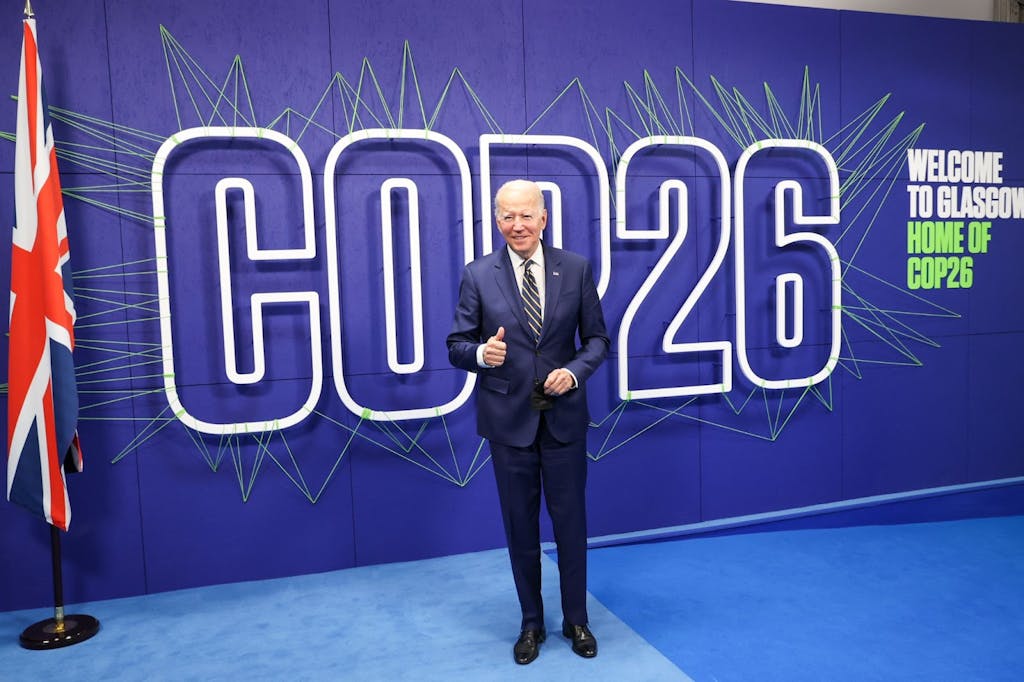
U.S. President Joe Biden arriving at COP26 World Leaders Summit of the twenty sixth United Nations local climate Change convention on the SEC, Glasgow. picture: Alan Harvey/ UK authorities
MG: and also you see this occurring on the UN masses over the previous decade: these kinds of public-private partnerships of like-minded nations or organizations or entities, typically with the private sector, typically with philanthropy, typically simply amongst nations getting collectively on their very personal, asserting that collectively they’re going to try this very discrete, concrete factor that can contribute to the broader decision. What else would you level to as a concrete accomplishment from this COP?
PO: All of these initiatives that you only’re pointing to are creating the situations for nations to do what we described earlier, which is to try to enhance targets. Presumably, with the work on methane, with the work on anti-deforestation, all this stuff that allow extra ambition from nations and over the course of the final couple of years — and particularly final yr — you had seen nations start to try this. for event, america, again in April, when President Biden introduced an aggressive, new goal for the nation to discover by 2030. The EU, Japan, Canada, and a lot of, many creating economies had all additionally set new enhanced targets in anticipation of this second, of COP being the deadline when all these can be assessed.
On the foremost day of COP, on the world leaders summit — which over a hundred and twenty world leaders attended — Prime Minister [Narendra] Modi grabbed headlines by asserting India’s personal new local climate targets for 2030, as effectively as to an prolonged-time period internet-zero goal. It was actually a extreme second and seen as a extreme contribution from one among many world’s largest emitters.
do you should look again to Paris, for the time being, the world was north of three.5-three.7° trajectory. by the objective all these new commitments had come down, for the yr 2030, you’re again all of the means down to roughly a 2.4° trajectory. you’ll possibly even see that there was important movement inside the most interesting route. nonetheless, you’ll possibly additionally see that we’re not effectively beneath 2°, a lot much less at 1.5°.
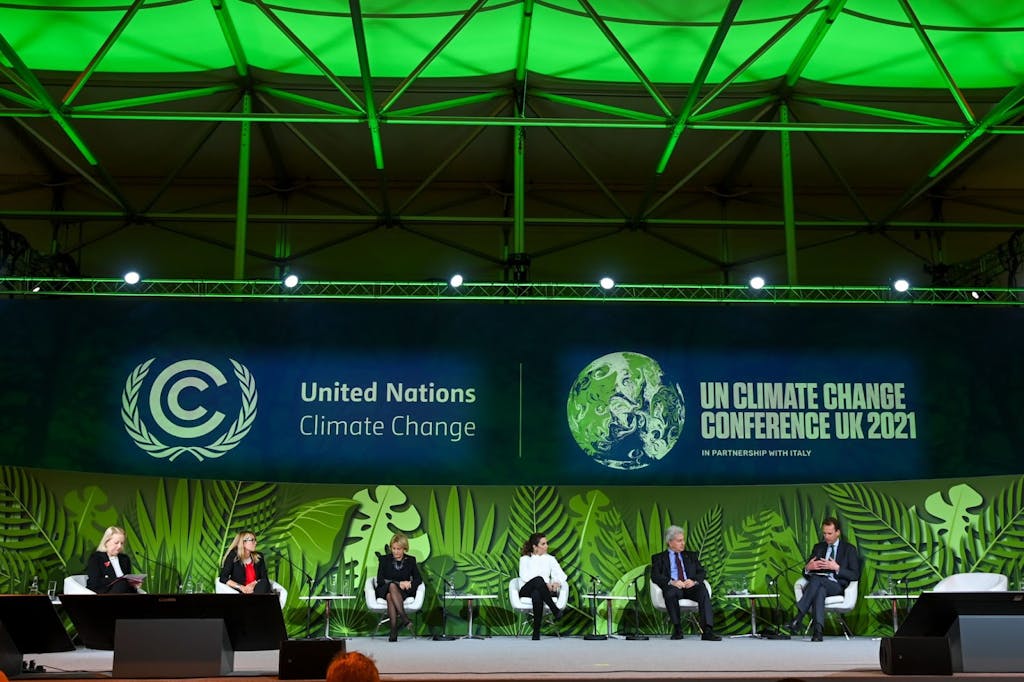
L-R Mary Shapiro, Jennifer Morris, Elizabeth Corley, Fernanda Mello, Saker Nusseibeh and Frank Elderson talking on the Forest event on the SEC, Glasgow. picture: Karwai Tang/ UK authorities
MG: Are there completely different factors you’ll cite as progress having been made at COP26?
PO: one among many massive challenges for COP was that actually on the Friday earlier than it started, China submitted its personal 2030 goal, which was a terribly barely enhanced variation of what it had made earlier than. That strong a little bit of a shadow over this because you’ll possibly want the world’s largest emitter, and people are actually eager to see them enhance their ambitions significantly. they usually did not try this.
one among many methods in which that was in the end resolved was with an enormous assist from the U.S. and China, which had an enormous headline-grabbing joint announcement by way of the closing stretch of negotiations. It was an enormous second for numerous causes. One is that the U.S. and China had, again inside the instances of the Paris settlement, found a means to work actually effectively and constructively collectively on local climate change and actually assist pave the most interesting means for the Paris settlement. That had actually fallen aside inside the following years, and the U.S.-China relationship broadly had gotten more and more fraught. whether or not or not some variety of bilateral dedication to this greater, very a lot multilateral world difficulty might very effectively be reasserted was actually not sure. I don’t suppose people have been actually anticipating it. A willingness for these two collectively to step out and lay out a imaginative and prescient for a means they’d proceed to work collectively was an enormous diplomatic breakthrough.
MG: One fascinating picture from all of the event was John Kerry collectively with his arm over the chinese language negotiator’s shoulder. You noticed the manifestation of that dedication to work extra carefully collectively between america and China after years of diplomatic paralysis.
PO: That’s proper. And it wasn’t simply when it entails them each being the most important emitters of greenhouse gases that they have been in a place to assist push the negotiations forward on the goal-setting agenda. in addition that they had an important joint dedication on the coal part-down, and traditionally, inside the UN framework course of and the Paris settlement, fossil fuels don’t get singled out and referred to as out. in spite of the whole lot, their part-down is implicit in these nationwide targets that people are setting, however nations have prevented coming round paperwork that explicitly name for the part-down of fossil fuels or coal.
And but you search round at COP, and there are all kinds of latest commitments doing simply this, and also you have obtained China itself grabbing a lot-deserved headlines on the UN regular meeting after they dedicated to not fund any extra new coal vegetation by way of their Belt and highway Initiative globally (they’ve been by far the main supplier of assist for mannequin new coal).
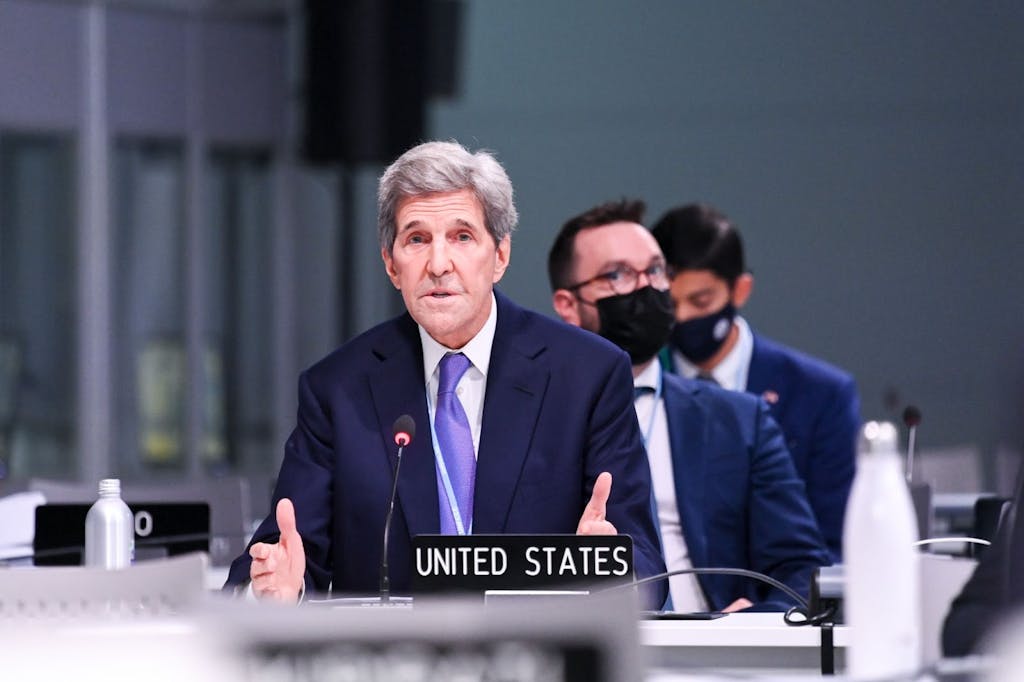
John Kerry, united states of america particular Presidential Envoy for local climate, speaks on the Presidency event; 4th extreme stage Ministerial Dialogue on local climate Finance on the SEC, Glasgow. picture: Karwai Tang/ UK authorities
These negotiations have proven a clear willingness to extra explicitly grapple with this. And one among many final factors that obtained dealt with on the negotiations, actually inside the closing hours, was round this language on the part-down, or phaseout of coal, and there was a terribly sharp variety of division inside the negotiating teams. India was very a lot calling for the inclusion of phasing down of coal, which as quickly as extra, is a foremost in these kinds of agreements. Others have been promoting a place of phasing out coal, and it was a terribly laborious-fought difficulty all of the means down to the wire. The U.S.-China settlement that had been labored out referred to as for phasing down coal — clearly that’s the place China was, and on the extreme of the day, that was the touchdown zone for the settlement.
MG: What, to your thoughts, was not achieved or left on the desk, or in any other case by some means disappointing to you as somebody who has been following these factors for such a terribly very prolonged time to not see included inside the doc?
PO: effectively, one among many hardest factors, and it nonetheless should be labored on, is the question of finance. This objective that was set out inside the Paris settlement — and actually was first articulated again in 2009 — of developed economies committing to mobilizing $one hundred billion yearly of private and non-private local climate finance for creating economies, was not met.
And to the credit rating of the U.S. and [other] developed economies, there wasn’t an try to create some variety of completely different set of particulars. They very a lot owned as a lot as a consequence of it. they’re quick by round $20 billion roughly, and that was not disputed. nonetheless, that was purported to be mobilized yearly starting in 2020, and it’s now 2021, and we’re nonetheless not there. That was an enormous disappointment. The question was: What are you able to do inside the context of a negotiation to try to restore this?
There have been calls from some creating economies that developed economies ought to primarily make up for these shortfalls in forthcoming years, repay their arrears. That was resisted by developed economies. They laid out a highway map and made political commitments to get to after which surpass the hundred-billion-dollar goal over the subsequent few years, however that’s one other promise. And the stress is admittedly going to be on developed economies to make good on that.
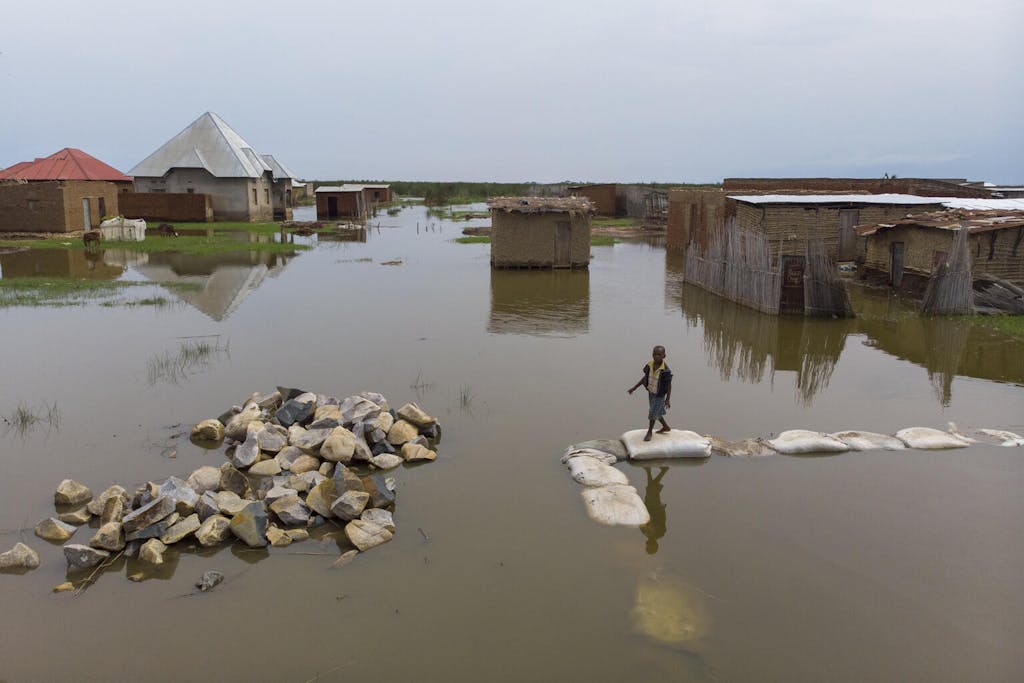
Burundi is terribly weak to local climate change and local climate change -triggered pure disasters. local climate financing might assist nations adapt to the impacts of local climate change already occurring. picture: Karel Prinsloo/ UNICEF
the completely different piece that was a step forward was on the share of that finance that goes in the direction of adaptation. A majority of this financing has gone in the direction of clear vitality financing, primarily serving to these nations to decarbonize their financial system and to get hold of inexperienced, clear vitality development paths. however an aspect of that funding may even be purported to assist them simply merely to adapt to the catastrophic impacts of local climate change which might even be already locked in and are too late to avert. The hope had been to get developed economies to variety of decide to having half of their finance go in the direction of adaptation, which might be a far greater proportion than at the second. They ended up committing to doubling their current share of adaptation financing from current ranges over the approaching few years. That’s directionally an important development. nonetheless it’s additionally one other piece of the broader finance dedication that they should meet. So i suppose as people start to rearrange for subsequent yr in Egypt, this difficulty goes to be actually entrance and coronary heart.
MG: Did COP26 reveal something new or completely different to you with regard to the current state of worldwide local climate diplomacy?
PO: the quantity of political consideration and public consideration on this COP even exceeded what I imagined. particularly contemplating all of the challenges and questions with regard to the COP and the timing of it, and with all of the factors round COVID, and the means do you execute one factor like this. The resilience of the local climate movement was actually palpable. people went to enormous lengths to try to be there. Reporters went to unbelievable lengths to cowl it. You had all of the foremost information shops there, and overlaying it with a spotlight and with an consideration to element that I’d by no means seen earlier than. All of that was actually encouraging.
With that extra scrutiny, people start to become extra aware of the challenges inside the method. The people who thought that this was going to be the extreme, and that the draw again was going to be all resolved are going to be upset. On the flip facet, there was progress on all fronts. I really feel simply like the worldwide course of, the Paris settlement, has stood up effectively to this actually difficult second.
MG: Would you contemplate COP26 worthwhile?
PO: i suppose it moved the ball forward in a means that was important. It additionally leaves a lot work to be executed. And it confirmed that nations really feel stress to come again to the desk, as they should, that the Paris settlement nonetheless is the very most interesting association for a majority of these worldwide actors to fulfill underneath, to barter underneath. nonetheless the extent of urgency, the extent of movement, continues to be not what we’d want it to be to resolve the draw again. we’re ready to’t afford to cool down and simply suppose that left to its personal devices, it’s going to resolve itself. And so i suppose we have gotten to variety of seize the progress, however then go actually laborious at the place these obstacles stay.
take heed to the Podcast

